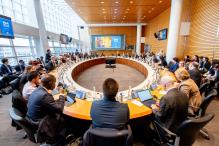The Financial Sector Commission on Modern Slavery and Human Trafficking has released its final report, Unlocking Potential: A Blueprint for Mobilizing Finance Against Slavery and Trafficking, during the United Nations General Assembly in New York.
The Commission is a public-private partnership between the Governments of Liechtenstein, Australia and the Netherlands, a consortium of Liechtenstein foundations and private sector institutions, and UNU-CPR – acting as its Secretariat. The Commission consists of 25 Commissioners, including survivors of human trafficking and child slavery; leaders from hedge funds, commercial and retail banks; institutional investors; development financing organizations; and global regulators.
The report is the culmination of a year of work by the Financial Sector Commission, which included four global consultations across three continents and over 100 informal consultations with stakeholders. With the release of the report, the Liechtenstein Initiative launches Finance Against Slavery and Trafficking, a project based at UNU-CPR, to further accelerate action by the sector. This includes support for implementation of the Blueprint and a collaboration with leading banks and survivor service providers to provide financial services to survivors of modern slavery and human trafficking.
The report outlines Five Goals to bolster the industry’s response to modern slavery and human trafficking. Each Goal is based on a set of proposed actions. These include: increasing resources for financial investigations of modern slavery and human trafficking; developing better indicators of trafficking-related money laundering and terrorist financing risks; promoting collaboration across the sector on human rights due diligence and social risk mapping; developing detailed leverage guidance; and investing in digital and social finance, including microfinance, to serve the most vulnerable. The report includes an Implementation Toolkit that will help the full range of financial sector institutions – from commercial and retail banks to fintech start-ups – take action to end modern slavery and human trafficking.
The Liechtenstein Initiative for Finance Against Slavery and Trafficking will continue the work of the Commission. One aspect of its work will involve cooperation with leading banks (Bank of America, Bank of the West, Barclays, BB&T, BMO Financial Group, Citi, Erste Bank, HSBC, LCNB National Bank, Scotiabank, U.S. Bank and Wells Fargo) and survivor service organizations for its href="https://www.fastinitiative.org/implementation/survivor-inclusion/">Survivor Inclusion Initiative. Survivors often find that traffickers have hijacked their financial identity or banking products for money laundering or other criminal purposes, spoiling their creditworthiness and increasing their risk of re-victimization. This initiative aims to provide a common approach for the safe extension of basic financial services to survivors, which will be scaled up and across multiple countries.
Access A Blueprint for Mobilizing Finance Against Slavery and Trafficking here.




